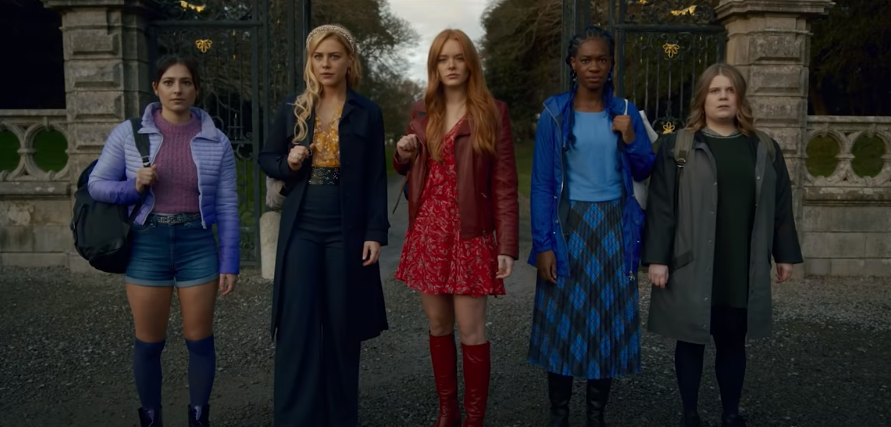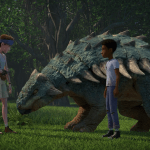“Fate: The Winx Saga” Season 1 Review: A Mess On So Many Levels

Fate: The Winx Saga is another unfortunate example of Hollywood deciding to stick a familiar name on a messy narrative to try and attract fans of the original IP. While there was potential for this series to be better, the writers were focused on retelling the usual YA tropes (including the Chosen White character having a concerned Black friend).
Even though the first season of Fate: The Winx Saga only had six episodes (each being around 52 minutes long), I still wasn’t able to binge-watch the entire thing in a day because of how boring it was. You would think a show about teen fairies would use this chance to stand apart from the Harry Potter franchise and the Chilling Adventures of Sabrina. But nopes. As far as Fate: TWS is concerned, there’s not a lot of difference between witches and fairies.
The elevator pitch for this show was likely, “Riverdale, but with magic! It will also fill the gap left behind by Sabrina ending on Netflix! We have to make it!”
Frankly, there was no reason for this show to be called Winx. I think viewers would have been more accepting of this series if it was just about a group of magical teens attending a secret school for fairies and Specialists (more on the Specialists in a bit).
And if this show wanted the Winx keyword in the title, I think it should have focused on a different band of teens instead of giving us live-action adaptations of Bloom and her friends from the popular animated franchise. Have Bloom and her friends be adults who are off completing dangerous missions in another realm and show how their school has changed over the years through the eyes of the new cast. There was definitely potential for this show to be better. The creative team just needed to care.
The premise of Fate: The Winx Saga has Bloom (Abigail Cowen), a sixteen-year-old, arriving at Alfea. She’s from the human world. Three months ago she didn’t even know that fairies existed. Strong emotions activated Bloom’s powers one night, which led to a fire inside the house and Bloom’s mother getting hurt. Bloom’s ready to learn more about her powers.
One would think Bloom would be in awe of stepping into the world of fairies, but she gets accustomed quite quickly because, for some weird reason, the world of fairies is similar to the human realm.
The poor world-building stuck out like a sore thumb throughout this series. Franchises like Harry Potter are able to create an impressive identity because they present a world different from what we’re used to. The world of wizards and witches, while secretly integrated into human society, is entirely different. Magical beings have their own way of living while staying hidden from normal humans.
The realm of fairies in Fate: TWS, on the other hand, has nothing unique about it. As Bloom walks around school, students are taking selfies on mobile phones, updating their Instagram Stories, driving in human cars, using laptops, etc. Bloom, while being in a different dimension, is able to video call her parents and access the internet for information. Like, why?
There aren’t any exciting classes to attend, either. The students are more interested in throwing parties, hooking up, and getting high. With Alfea looking like any other human high school, I didn’t want to spend another second there.
There’s no sense of diverse culture or identity in a school housing fairies and Specialists from different regions. Everything is just very European (read: white).
Anyway, Bloom soon meets her roommates, the Light fairy and Princess of Solaria Stella (Hannah van der Westhuysen), the Water fairy Aisha (Precious Mustapha), and then two other fairies that landed this show in a casting controversy. Flora has been replaced by the Earth fairy Terra (Eliot Salt), and the Mind fairy Musa is played by Elisha Applebaum.
I rolled my eyes when Terra said that Flora was her cousin. From what I can tell, replacing Flora with a white Earth fairy was likely due to the casting team not wanting to look for three Latino actors. I say this because Terra’s father is a teacher at Alfea and her brother Sam is also a student. So, instead of finding the right actors to cast as Flora, her father, and her brother, the casting team decided to go the simpler route.
As for Musa, while her casting isn’t accurate (the animated Musa was inspired by actress Lucy Liu), turning her into a Mind fairy was a lazy writing decision. It’s as if the writers couldn’t find a way to feature Musa’s sound-related powers (from the animated series) in the live-action version.
Oh! And Tecna isn’t even mentioned. With the fairy realm using a whole lot of technology, having Tecna be part of the cast would have made more sense than the existence of Mind fairy Musa.
While Bloom’s (very self-centered) arc is about unraveling the mystery behind her true parentage, her friends get certain arcs, too. Musa has to find the internal strength to open herself and use her powers to help those in pain. She closed herself off after her mother died and she was forced to feel the agonizing moment as an empath.
Stella’s character growth involves her finding a better way to control her powers (an accident led to Stella blinding her friend) and standing as her own away from her mother’s shadow. She also had to realize that her romantic relationship with Sky was toxic and breaking up was the best option for the both of them.
Terra’s development (for a lack of a better word) had her overcoming her insecurities as someone who isn’t as slim as her peers. She’s basically every Hollywood trope related to plus-sized characters. So, meh!
The only main cast member that doesn’t have a character arc is Aisha. The way the writers decided to not give the ONLY main Black character an arc and have her existence revolve around Bloom was unfortunate. Everyone has their own lives and friends outside what Bloom is doing except for Aisha. Sigh!
As for the Specialists, we have Stella’s ex-boyfriend and Bloom’s current romantic interest Sky as a second-year-student. Riven is Sky’s friend who likes to bully first-years. And we have Dane, a first-year who is attracted to both Riven and the troublemaker (and straight-up murderess) Beatrix.
One would think a show about magical fairies set in a school where boys can be fairies, too, would have well-written queer representation. Well, you thought wrong. Yes, Dane and Riven aren’t 100% straight and they obviously have a thing for each other. But seeing the not-so-good-guys delivering the show’s only (and very cliche) queer rep was tiring to see.
Not to mention all of the homophobic and sexist jokes that Riven nonchalantly makes. Riven and Dane also make fun of Terra’s weight. Such a mess!
Before I move on from the Specialists, can someone tell me what their purpose was? They’re clearly incompetent without a powerful fairy or two supporting them. Why not create an original fairy type that’s proficient in sword-fighting, archery, shielding spells, etc., instead of making Specialists look like normal humans running around with swords and doing nothing?
Or why not have fairy magic be disruptive to technology and that’s why technological advancements have to be managed by Specialists? Again, there was potential in this show. I should have been in the writers’ room!
Coming to a couple of things I found interesting (yes, there are some intriguing moments present), I liked how the main characters took time to become proper friends. I also liked the military-centric history of Alfea and how killing an entire community led to certain adult characters experience a lot of guilt for more than a decade. Surprisingly, the narrative in Fate: The Winx Saga featured genocide and the confusion that occurs when things aren’t so black and white. Unfortunately, the series doesn’t explore such topics properly. Instead of offering a well-paced storyline, the creatives focus on offering random twists and turns (so many twists and turns!) to try and answer certain questions.
Not only did the storytelling need work, but the limited budget didn’t help either. There are sequences that could have worked a lot better if the show had more money to spend.
Only Bloom’s able to achieve a fairy transformation, and that too during the sixth and final episode. Said transformation is just boring. To be fair, I liked the fiery texture of her wings, but the fact her outfit didn’t change, she didn’t fly, and her wings got a lot smaller took away major points.
Why would you even want to do a live-action adaptation of an IP when you know it will require a substantial budget to do it justice?
Anyway, whether you’re a fan of the Winx animated series or not, Fate: The Winx Saga season just doesn’t have much to offer if you’re into well-written narratives or something different from the usual teen-centric fare out there.
I wouldn’t be disappointed if it doesn’t get a second season (all the best to the cast and crew, of course!). Let’s see what Netflix decides to do.
Fate: The Winx Saga season 1 premiered on Netflix on January 22, 2021.
Feel free to share your thoughts with us.
Author: Farid-ul-Haq
Farid has a Double Masters in Psychology and Biotechnology as well as an M.Phil in Molecular Genetics. He is the author of numerous books including Missing in Somerville, and The Game Master of Somerville. He gives us insight into comics, books, TV shows, anime/manga, video games, and movies.
Help support independent journalism. Subscribe to our Patreon.
Copyright © The Geekiary
Do not copy our content in whole to other websites. If you are reading this anywhere besides TheGeekiary.com, it has been stolen.Read our







Putting “Winx” in the title is clearly a way to draw in fans of the show. Sadly, this is NOT what the fans wanted. At all.
Not only did they whitewash an already diverse cast but the lack of world building is just sad.
Will the show be renewed? Who knows? If it is, I certainly hope they get more eps. and better writers.